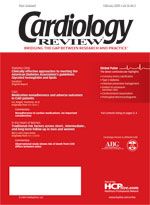Women and acute coronary syndromes
Drs Pfeifer and Steingart (page 11) provide a timely report on recent findings affecting the assessment and treatment of women with acute coronary syndromes.
Drs Pfeifer and Steingart provide a timely report on recent findings affecting the assessment and treatment of women with acute coronary syndromes. As noted by the authors, women are more likely to die from coronary artery disease (CAD) than from any other form of cardiovascular disease. Although the Women’s Health Initiative (WHI) did not specifically address all forms of acute coronary syndrome, the large number of women studied provides meaningful guidance for some management decisions. In the WHI study, the occurrence of myocardial infarction (MI), coronary death, and revascularizations was carefully evaluated, and conjugated equine estrogens with or without medroxyprogesterone were not shown to lower the risk of CAD outcomes. The WHI observational study also confirmed that women with traditional risk factors (hypercholesterolemia, diabetes, and smoking) were at increased risk for developing angina requiring hospitalization or MI.
The Women’s Ischemic Syndrome Evalua­tion (WISE) study identified anemia as an unrecognized risk factor for adverse outcomes in women with angina-type symptoms. Other findings from WISE have emphasized the adverse association of symptoms and abnormal magnetic resonance spectroscopy with future cardiac outcomes, even if no focal significant stenosis is identified by coronary angiography.1 Indeed, the WISE investigators have raised awareness that the angiographic appearance of the coronary arteries should not be the final test for women with symptoms. Bugiardini and Bairey Merz have provided evidence for endothelial dysfunction, and they postulate that women, more than men, have ongoing inflammatory and reactive abnormalities leading to microvascular ischemia as a source of symptoms and future adverse outcomes.2
Fortunately, the major national cardiology societies now have included specific guidance for assessing and treating women with acute coronary syndromes. The Can Rapid Risk Stratification of Unstable Angina Pa­tients Suppress Adverse Outcomes with Early Im­plementation of the American College of Cardiology/American Heart Association Guide­lines (CRUSADE) study findings offer updated information on the application of such guidelines in clinical practice, with persistent disparities still identified. Adjusted risk for mortality, however, did not differ between men and women in the CRUSADE or the Clopidogrel in Unstable Angina to Prevent Recurrent Events (CURE) studies.3 Re­searchers still have to determine whether adherence to guidelines might further lower adverse outcomes for women or whether recommendations may actually be too aggressive and lead to increased adverse events. Some of the management trials for immediate compared with staged intervention for acute coronary syndrome seem to support the idea that highly aggressive strategies may not always improve outcomes. Controversy continues, how­ever, over the types and dosing of medications as well as the need for and performance of acute coronary interventions for women. The identification of aspirin resistance as a contributor to poorer outcomes appears to have particular relevance for wom­en, especially if larger studies confirm that women are more likely to be affected.
Pfeifer and Steingart have summarized a number of reports that identify features of acute coronary syndrome in women that will assist cur­rent medical decisions and focus attention for future research. Until more results are reported, practitioners are correctly urged to follow existing management guidelines. However, gaps in the evidence base must also be acknowledged. Since most cardiac clinical trials still enroll only a minority of women, the optimal prevention and treatment strategies for women are not yet defined.
